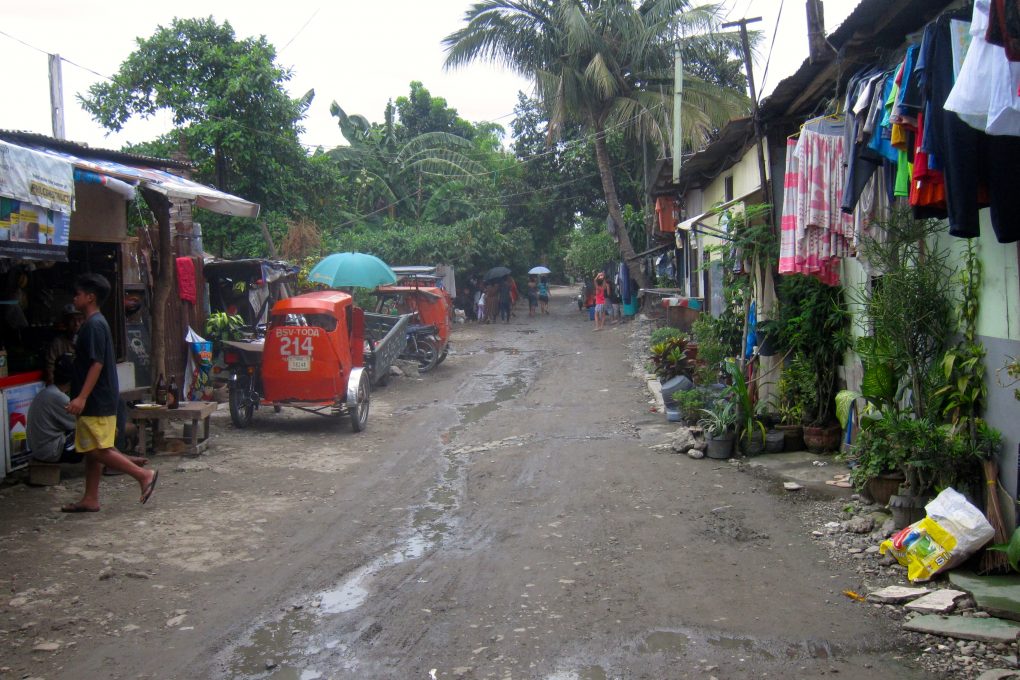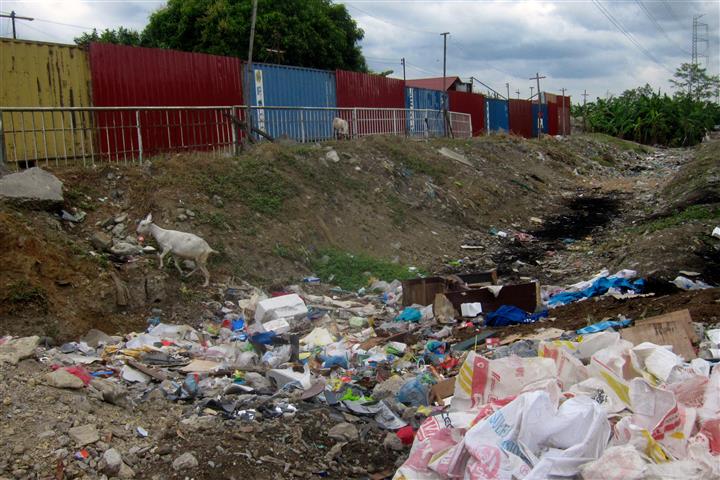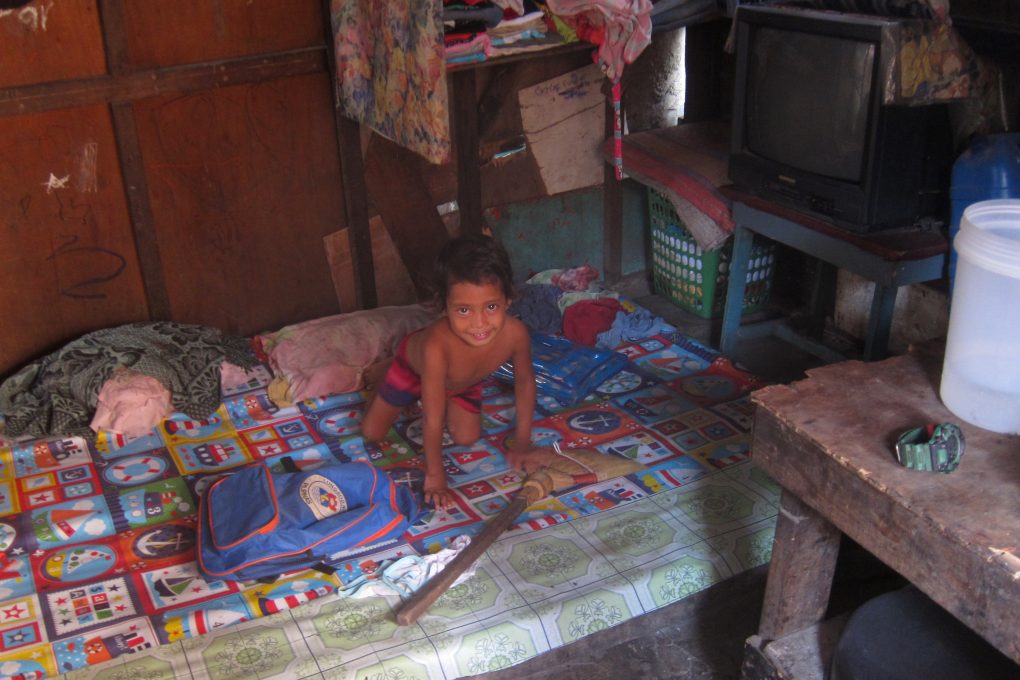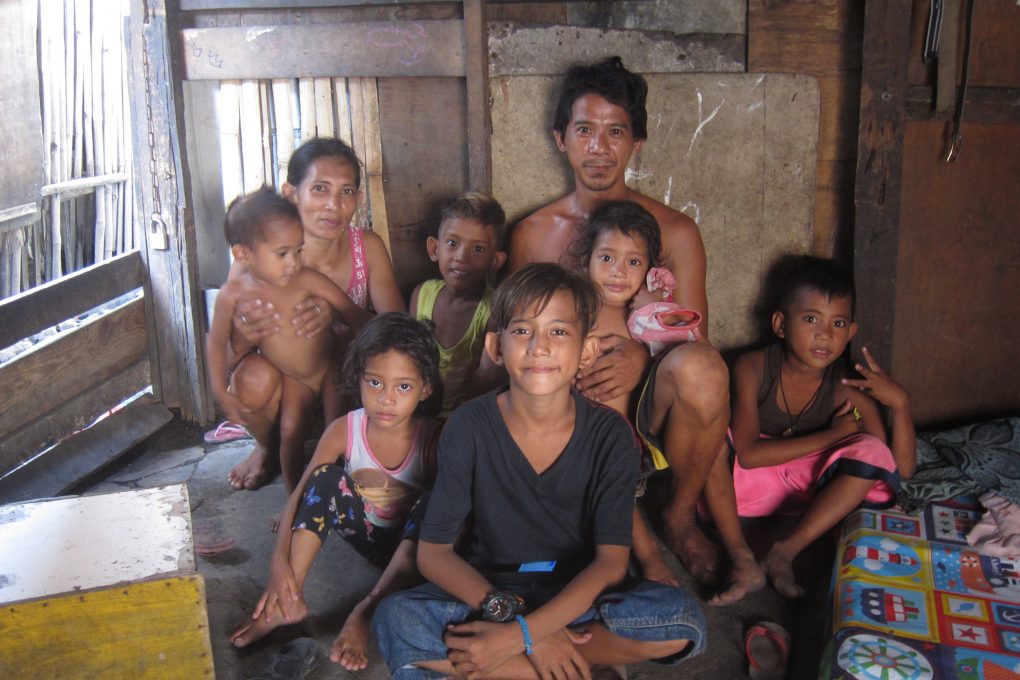“For one kilo plastic we get 20 pesos”, she says with a sigh. Despite that she smiles and I wonder why. “This night we made 200 pesos so that was a good night” she tells.
It is Monday afternoon and the sun is burning down on us from the blue sky. The air is thick and filled with black clouds from the old jeepneys that fill up the street. We walk alongside the road. The concrete is burning the bottom of my shoes. People shout around me. Their desperate yelling is mixed with the traffic. A young woman walks past me. She has a kid under her arm. Three boys run around her. They call her mom. They laugh and race in the tumult of the streets. They disappear in the crowd and the black clouds. Their mother shouts for them and seconds later they are once again running around her in circles. Their feet are black from the chaos of the streets. The boys are carrying lids in all the colors of the rainbow. They throw them through the puddles around them so that they skip and thereafter run around amongst each other.
We move further down the street and are swallowed by the crowd around us. A woman is standing on the side of the road. She looks at us with modesty in her eyes and then a smile. She has been waiting for us, and it she, we have come to meet up with. I put out my hand to greet her. Startled she takes it and shakes my hand while continuing to smile. Two little girls are hugging her legs. They have big brown eyes and curly hair. They almost don’t dare to look at me and I don’t blame them. I look like a giant compared to the people around me. To boys come running towards me. One of the boys puts a dirty hand in my direction and tells me his name. I take his hand and smile. He stares at me while repeating my name. The woman tells us to follow her and that she lives right around the corner. The sun is still burning. Our foreheads are gleaming with sweat. The two girls hold on tight to the mother’s hand while looking around with their big frightened eyes. The boys run through the crowd like were they in a maze while laughing and laughing.

We continue down the street. On the street corner is a small cart that sells deep-fried bananas on a spear. A little lady is roasting bananas in the shade of a stripped umbrella. A smell of oil, bananas and traffic fills my nostrils. The street becomes narrower and now only consists of broken bricks and colorful tiles hiding in the dust. We go through a maze of houses made of thin pieces of wood and cardboard. The ground is moist and it smells like rain. I look up towards the sky where the black clouds have now gathered. Despite of this the sun is still present and casts its light down on the houses. I squint my eyes in the bright sunlight. We walk between garbage, cords and puddles of water that smells like pee. I look around on the many faces that all greed me politely.
We disappear further into the maze of homes. We walk in a straight line. My steps are small. A man without his shirt on is walking towards us. He has long and skinny arms that dangle down along his sides. I stop and turn my back to the warm wall. It is too narrow for the both of us to pass at the same time. “Good afternoon” he says when passing me. I politely repeat his words. It is moist. There is not a single wind moving. We continue walking between the houses. I balance between the bricks and wooden boards that make up the path we are walking on. I look up towards the sky. It is looking dangerously back at me. Dark clouds swallow the heat from the sun. It will rain soon, I think.
At the end of the maze we arrive at a little room. The woman says that it is their house – their home. Not many people would categorize this home as a house, I think to myself. It is a room with four walls, but it is a home. There is no door, only a knee-high piece of wood to secure that the children don’t crawl out. I raise my leg and step into the home. The light from the afternoon sun hits the room without direction. I look around. Two pieces of wood creates a bed. The woman follows my glance around the room. “The kids sleep here” she says and points towards the wood pieces. I nod with seriousness in my eyes while I count the children around us. All in all there are six. I look at the children and then down on the beds. I imagine how they must have to pile up in order to all fit. I ask where she sleeps while I look around. “My husband and I sleep on the floor” she answers me and points at the moist ground. I nod and imagine once again how she and her husband lay closely on the floor. On a table in the corner stands a pot, some plates and mugs. This must be the kitchen, I think, but at the same time I wonder how much food is actually served here.
I sit down on the thin pieces of wood that are known as the bed. Two of the boys throw themselves down next to me. The mom sits down in the middle of the floor. While breastfeeding her child she talks about the everyday life of the family. We sit across from her and listen with big eyes. I feel how the heat is eating me up. I wipe my forehead with the sleeve of my t-shirt but shortly after the sweat covers me again.
“I provide for the family,” the woman says while looking down on her child. “My husband doesn’t work anymore. After our new president he has been put in the spotlight because of the narcotics and therefore he doesn’t move around the nightlife anymore. He doesn’t want to work,” she continues. Her eyes are tired and her mouth tight. I want to know what she does to provide for the family. It must be hard for a mother of six to provide for a family in the slum and to live with a wanted husband who uses the money on alcohol and drugs. She tells us that she collects garbage and plastic to sell to the junk shops. She leaves at night with her two oldest sons. They take a jeepney to Divisoria where they wander the streets until midnight. They mostly collect plastic bottles and they collect a lot. The lids are thrown away since they can’t be sold. She tells how the weight of the plastic is crucial. “For one kilo plastic we get 20 pesos”, she says with a sigh. Despite of that she smiles and I wonder why. “This night we made 200 pesos so that was a good night” she tells. They don’t get back until the next morning. When they have gathered the plastic they have to wait for the junk shop to open so that they can sell their kilos. They sleep in the street and wait for morning to come. But that’s life in Manila as she says. No one helps us so we must help ourselves. We are invisible.
I sit with my eyes almost closed, trying to understand. I breathe heavily. The room suddenly seems darker. The light from the sun no longer shines through. It is still moist and damp. In a corner lies one of the daughters, crying. She has a fever, tells the mother. She gets up from the ground and walks over to her daughter. She picks her up and holds her tightly. She strokes her forehead and kisses her. I smile and think that she is a good mother. We sit in silence. The oldest boy comes over and sits next to me. He tells that he goes to school. Most of the time that is. “Sometimes he doesn’t show up in school because he is too tired. It is long nights for him when we are out picking up plastic. When we get home in the morning he sleeps,” the mother says while continuing rocking her daughter back and forth in her arms. A lump forms in my throat while I nod in understanding. The boy smiles shyly and looks my way. “Do you know how to spell Dundee?” he challenges me. I shake my head and let him spell out his name for me. He looks proud when he is done. “You are good” I say and ask him if he likes going to school. He nods.
The afternoon is turning into night. The twilight eats the day. I don’t want to be in the slum once it gets dark, I think to my self. But I don’t know if I’m afraid. The woman is nice and is constantly smiling. Her smile fills me with a strange calmness. At the same time my stomach is turning. I think it is unfair that they have to live her. It is unfair that a mother of six has to wander through Manila at night in order to make a small amount of money. But no one sees them, they are just there. Just like many others who are swallowed by the crowd in the streets.
I lift my heavy legs and dug my head when I leave the room, their home. We walk back the same way as we came, through the narrow paths. The mother guides us out of the maze. The daughter with the fever dangles on her shoulder. The boys run around us. The sky is still dark from the clouds. Along the houses people are burning piles of trash. The smell of burnt plastic is horrible. A boy pokes the burning garbage with a stick. He is small and wearing a basketball shirt that covers him all the way down to his knees. “Americanah” he yells in excitement when he sees me. I smile and let him believe that I am American. I guess it doesn’t matter.
The street is just as chaotic as when we left it. We walk down the road as a group. People are starring. It is going to rain soon, I think. At a yellow tricycle we stop. We are going back the same way as we came. I shake the mother’s hand and tell her that I am happy to have met her. She smiles back at me. The daughter on her shoulder is a sleep. We squeeze into a small tricycle and wave goodbye to the family behind us. I watch the streets passing. None of us say anything. The silence speaks for itself. The family had nothing. Despite of this they kept on smiling. Puzzling, I sink deeper into the noise from the tricycle. The rain starts falling from the dark clouds in the sky.
Contributed by Sarah Staub, SFI volunteer


